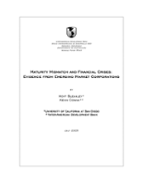Maturity Mismatch and Financial Crises: Evidence from Emerging Market Corporations
Date
Jul 2005
Substantial attention has been paid in recent years to the risk of maturity mismatch in emerging markets. Although this risk is microeconomic in nature, the evidence advanced thus far has taken the form of macro correlations. This paper empirically evaluates this mechanism at the micro level by using a database of over 3,000 publicly traded firms from fifteen emerging markets. The paper measures the risk of short-term exposure by estimating, at the firm level, the effect on investment of the interaction of short-term exposure and aggregate capital flows. This effect is (statistically) zero, contrary to the prediction of the maturity-mismatch hypothesis. This conclusion is robust to using a variety of different estimators, alternative measures of capital flows, and controls for devaluation effects and access to international capital. The paper finds evidence that short-term-exposed firms pay higher financing costs and liquidate assets at fire sale prices, but the paper does not find that this reduction in net worth translates into a drop in investment.



